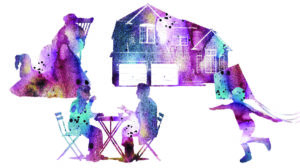Hashem, this is the day You gave me


“Everyone who lost someone in the attack felt that its message was that we have to feel a sense of achdus and connection not distance. I also wanted to make an accounting of all the chesed done for us to say to Hashem — look what Your people did. To say to people — look what we did for each other”
F or close to a year her husband’s name — Chaim Yechiel ben Malka — was in the prayers of Jews around the world. Four of his neighbors and friends had been viciously murdered by two Arab terrorists who invaded their shul during the quiet holy moments of Shemoneh Esreh.
Chaim (Howie) Rotman was grievously injured in the attack. He lived for 49 weeks never regaining consciousness. Upon his passing his wife Risa joined the four other widows of what became known as the Har Nof Massacre; the ten Rotman children brought the number of orphans to 36.
From the morning of the attack through the Motzaei Shabbos levayah for Risa it was a year of waiting hoping weeping praying growing. Of sitting at her husband’s bedside day after day.
A year followed by a week of shivah.
“And then what?” I ask Risa as we sit together at her dining-room table. “How did you feel when it was all over?”
“Shivah ended Sunday morning. My brother-in-law Steve and my mother-in-law [from Canada] stayed until Wednesday. And then all of a sudden I was like now what? Who am I now? For a year every night I’d put my thermos next to the kettle my bag next to the door. I’d get my kids ready for school and go to the hospital or rehab facility.
“I moped around Wednesday and part of Thursday. Then I said to myself Risa you’re being silly. Nothing has changed. This year it’s always been: ‘Hashem this is the day You gave me and I hope that I do good with it.’ And that’s still true.”
It’s an interesting experience conversing with Risa Rotman. Far-ranging doesn’t quite describe it: It’s more like all her life is packed together in one giant basket: sitting beside a comatose husband for close to a year finding a parking space near the Kosel dealing with insurance paperwork raising a large family writing a book making a speech breaking a food processor. Emotions too: During the weeks when I edited her newly released book Terror and Emunah in Har Nof: A year of growth and faith through our many conversations we could segue from one emotion to the next — loneliness vulnerability humor sadness hope.
Thinking about our conversations I realized there was a reason everything we talked about seemed to come from one large basket one giant source: It’s because Risa Rotman is acutely conscious that everything — great and small tragic and joyous — everything in the basket of our days years lives comes from One Source.
Hashem this is the day You gave me.
Where does it come from this emunah this rock-solid belief that everything originates from Hashem and therefore everything whether bitter or sweet is ultimately good?
An unexpected answer. “Gratitude helps me so much.”
What’s the connection?
“Without gratitude you look at the difficult things in your life you say it’s not fair why is it so hard for me where is Hashem? That means you didn’t look at the whole picture. You went over to a tapestry and saw this dark icky spot but what about all the colors that make the tapestry look beautiful? You see the hard stuff and you miss out all the good.
“Gratitude is like a muscle: The more you say thank you the more you strengthen the gratitude and the more you see the good or see why what seemed bad is good. If you’re going to take the tough things to the Source you have to take the good stuff too.” (Excerpted from Family First Issue 567)
Oops! We could not locate your form.












